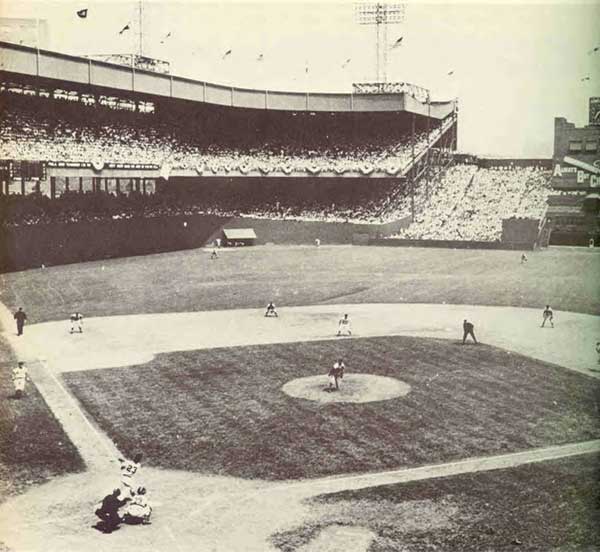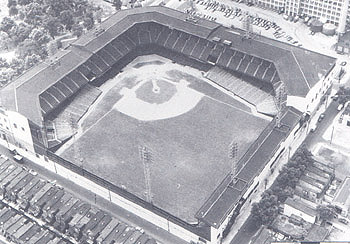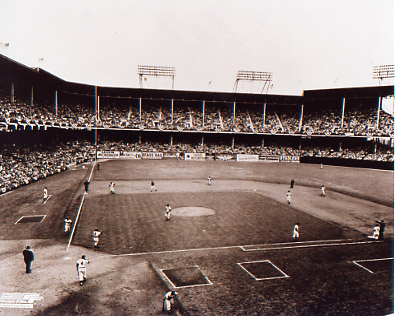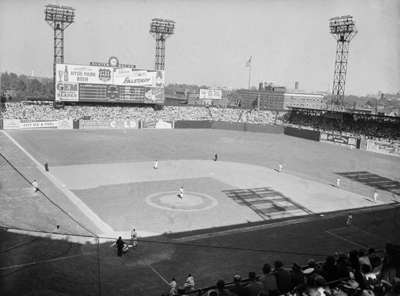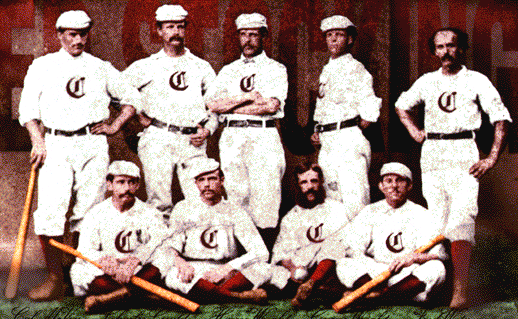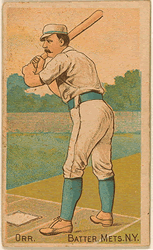Professionalism and the Cincinnati Red Stockings
 After the civil war, it was obvious baseball was headed toward professionalism. Jim Creighton was always believed to be paid and in 1867, Al Spalding (17 years old) was offered a clerkship if he played baseball for the Chicago Excelsiors. But up until 1869, it was still kept a secret for the most part. The biggest baseball event in the early years after the Civil War, was the great national tour of the Washington Nationals Club in 1867. In that year, the Nationals were by far the best team in the land and they set out to prove it. The great writer and baseball expert, Henry Chadwick accompanied them on the tour. There star player was shortstop George Wright, younger brother of already well known, Harry Wright.
After the civil war, it was obvious baseball was headed toward professionalism. Jim Creighton was always believed to be paid and in 1867, Al Spalding (17 years old) was offered a clerkship if he played baseball for the Chicago Excelsiors. But up until 1869, it was still kept a secret for the most part. The biggest baseball event in the early years after the Civil War, was the great national tour of the Washington Nationals Club in 1867. In that year, the Nationals were by far the best team in the land and they set out to prove it. The great writer and baseball expert, Henry Chadwick accompanied them on the tour. There star player was shortstop George Wright, younger brother of already well known, Harry Wright.
 One of the Nationals first games was a rout of 90-10 at Columbus. Other blow out game ensued and Nationals garnered headlines throughout the country that summer. Then they rolled into Chicago, where a number of good teams played. There first game though was against the Forest City Club of Rockford, led by future stars, Al Spalding and Ross Barnes. It was a back and forth battle from the start although the Forest City team was visand by mid-game, 17 year old pitcher, Spalding and the rest of his teammates sensed and upset. So did the Nationals and by the end of the day, Forest City had surprised the country with a 29-23 win. Spalding instantly became reknowned. But to show just how much of a surprise the game had been , the Nationals trounced Forest City's cross-town rival, Chicago Excelsiors, 49-4 the very next day. The Excelsiors would never recover.
One of the Nationals first games was a rout of 90-10 at Columbus. Other blow out game ensued and Nationals garnered headlines throughout the country that summer. Then they rolled into Chicago, where a number of good teams played. There first game though was against the Forest City Club of Rockford, led by future stars, Al Spalding and Ross Barnes. It was a back and forth battle from the start although the Forest City team was visand by mid-game, 17 year old pitcher, Spalding and the rest of his teammates sensed and upset. So did the Nationals and by the end of the day, Forest City had surprised the country with a 29-23 win. Spalding instantly became reknowned. But to show just how much of a surprise the game had been , the Nationals trounced Forest City's cross-town rival, Chicago Excelsiors, 49-4 the very next day. The Excelsiors would never recover.
 By 1869, Aaron Champion, a Cincinnati businessman was ready to take professionalism public. He along with a number of Ohio investors contacted Harry Wright and gave him a $15,000 cap to build the team. Harry Wright, already known as being a keen manager, quickly contacted his younger brother, George, who was quickly becoming one of the best players in the country. Out of the ten regular players that would play for Wright's Red Stockings only would be from Cincinnati. Below is the team with their salaries.
By 1869, Aaron Champion, a Cincinnati businessman was ready to take professionalism public. He along with a number of Ohio investors contacted Harry Wright and gave him a $15,000 cap to build the team. Harry Wright, already known as being a keen manager, quickly contacted his younger brother, George, who was quickly becoming one of the best players in the country. Out of the ten regular players that would play for Wright's Red Stockings only would be from Cincinnati. Below is the team with their salaries.
